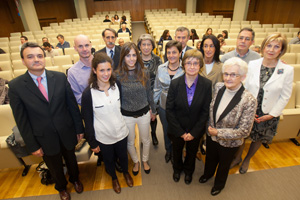"We will become extinct as has happened to every other species on the planet."
José María Bermúdez de Castro, award Prince of Asturias of research, closes the lecture series of the Science Weeks.
"We will become extinct as has happened with all the other species on the planet", says José María Bermúdez de Castro, award Príncipe Asturias de research Scientific and Technical in 1997. The co-director of the excavations of the Pleistocene sites of the Sierra de Atapuerca has Closed the lecture series of the Science Weeks of the University of Navarra with a discussion paper on the "Fundamental Milestones of Human Evolution".
The expert spoke of the configuration of present-day man and explained that he has almost doubled his longevity; however,"it has not yet been achieved that the extra years he lives, thanks to new advances, have the same benefits and quality as his youthful life". On the other hand, he highlighted the uncertainty as to whether homo sapiens will be able to give rise to a "daughter" species with other adaptations, which could produce a change in the direction of evolution.
He also referred to what humans have in common with the genealogy of chimpanzees that lived six million years ago and the changes that have been taking place in the human lineage. "Three million years ago there were important changes such as those that took place in the Anatomy of the hand, the elaboration of tools or a greater consumption of animal proteins. However, the most spectacular was the one that took place in the development and maturity of the brain". In his opinion, the most significant milestone in human evolution has been the increase in brain size: "Brain changes have been the 'pacemaker' of our evolution, manager of others such as language".
Finally, José María Bermúdez de Castro stressed that"speaking only of men is a cultural topic difficult to banish in societies where one sex has prevailed over the other. This is a serious mistake that deserves a long reflection".
Extraordinary awards of licentiate degree, Degree and doctorate, on the day of the patron saint

On the other hand, the extraordinary prizes of licentiate degree and Degree of the academic year 2012-13 were awarded to Alba Martín Moreno (licentiate degree in Biology), Pilar Menéndez Gil (licentiate degree in Biochemistry ), Jon Sánchez Munárriz (Degree in Biochemistry ), Beatriz Sánchez González (Degree in Biology) and Samuel Martínez Erro (Degree in Chemistry).
The Science Weeks of the University of Navarra will close this Saturday, the 16th, with an Open Doors and Experimentation workshop for students and their families. high school diploma and their families, prior to the registration.





